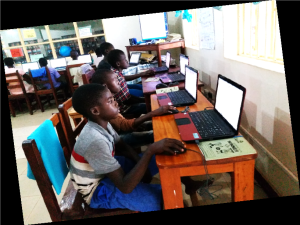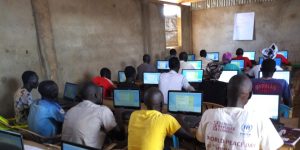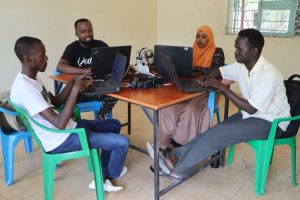Empowering Refugees through Technology-Selemani
Empowering Refugees through Technology
Introduction
Empowering refugees through technology refers to the use of various digital tools, services, and innovations to enhance the well-being, opportunities, and self-reliance of individuals and communities forced to flee their homes due to conflict, persecution, or other crises. This approach recognizes the unique challenges faced by refugees and aims to address them through the following means.
While humanitarian organizations and governments work tirelessly to provide assistance, shelter, and support to refugees, the sheer scale of the crisis demands innovative approaches to empower displaced populations and enhance their self-reliance.

One such innovative approach is the use of technology. In recent years, various digital tools, services, and innovations have emerged as powerful tools in addressing the unique challenges faced by refugees. Technology can provide access to vital information, connect refugees with education and employment opportunities, offer access to healthcare services, facilitate communication and social support, and even assist in financial inclusion. This essay aims to explore the concept of “Empowering Refugees through Technology” comprehensively, examining the various ways technology is being harnessed to empower and support refugees, the opportunities it presents, and the challenges it encounters.
What is Empowering Refugees Through Technology
Empowering refugees through technology refers to the use of various digital tools, services, and innovations to enhance the well-being, opportunities, and self-reliance of individuals and communities forced to flee their homes due to conflict, persecution, or other crises. This approach recognizes the unique challenges faced by refugees and aims to address them through the following means:

- Access to Information: Technology can provide refugees with access to critical information, such as legal rights, available services, healthcare resources, and educational opportunities. Mobile apps, websites, and digital platforms can serve as channels for disseminating this information.
- Connectivity: Access to the internet and mobile communication can help refugees stay connected with their families, support networks, and the wider world. It allows them to maintain a sense of belonging and access online resources, including education and job opportunities.
- Education: Technology can enable displaced individuals, including children and adults, to continue their education through online courses, virtual classrooms, and digital learning materials. This is especially important when traditional schools are unavailable.
- Vocational Training and Employment: Digital skills training and online job marketplaces can help refugees acquire new skills and find employment opportunities, even in challenging circumstances. Freelancing platforms and remote work options are often leveraged for this purpose.
- Financial Inclusion: Mobile banking and digital financial services can provide refugees with access to banking and financial tools, allowing them to save, transfer money, and engage in economic activities more easily and securely.
- Healthcare: Telemedicine and healthcare apps can provide refugees with access to medical advice and support, particularly when they have limited access to physical healthcare facilities.
- Communication and Advocacy: Social media and communication apps can help refugees share their stories, connect with advocacy groups, and raise awareness about their situations and needs.
- Refugee Registration and Documentation: Biometric technology and digital registration systems can help governments and humanitarian organizations better track and assist refugees, ensuring they receive the necessary services and protections.
- Aid Distribution: Blockchain and digital payment systems can enhance the transparency and efficiency of aid distribution, reducing fraud and ensuring that resources reach those in need.
- Social Support and Mental Health: Virtual support groups, counseling apps, and online mental health resources can provide emotional and psychological support to refugees dealing with trauma and stress.
- Language and Cultural Integration: Language learning apps and online communities can help refugees acquire language skills and better integrate into their host societies.
How to Bring Awareness to Refugees
Overall, empowering refugees through technology seeks to address the unique challenges faced by displaced populations and improve their quality of life, self-reliance, and prospects for the future. It often involves collaboration between governments, NGOs, tech companies, and local communities to develop and implement innovative solutions.

How do you Empower Refugees?
Empowering refugees involves providing them with the tools, resources, and opportunities they need to rebuild their lives, regain their independence, and contribute to their host communities. Here are several key ways to empower refugees:
Access to Information:
-
- Provide refugees with accurate and up-to-date information about their rights, available services, and opportunities, using digital platforms, mobile apps, and community resources.
- Translate information into multiple languages to ensure accessibility for individuals from diverse linguistic backgrounds.
- Promote awareness of available resources through outreach programs, workshops, and community networks.
- Education and Skills Training:
- Establish educational programs, including formal and informal schooling, to ensure refugee children and adults have access to quality education.
- Offer vocational training and skill development programs tailored to local job markets and the specific needs of refugee populations.
- Promote digital literacy and computer skills to enhance employability in an increasingly tech-driven world.
- Employment Opportunities:
- Collaborate with local businesses and industries to create job opportunities for refugees, recognizing their skills and talents.
- Support entrepreneurship by providing training, mentorship, and access to microloans for refugees interested in starting their businesses.
- Connect refugees with online freelancing platforms and remote work opportunities.
- Financial Inclusion:
- Facilitate access to banking services and digital financial tools, such as mobile banking apps and digital payment systems.
- Promote financial literacy to help refugees manage their finances effectively, save money, and plan for the future.
- Encourage the use of savings and microfinance apps tailored to the needs of refugees and underserved communities.
- Healthcare Access:
- Ensure refugees have access to affordable and quality healthcare services, including vaccinations, maternal care, mental health support, and emergency medical care.
- Establish mobile clinics or telemedicine services to reach refugees in remote areas or areas with limited healthcare infrastructure.
- Provide information on healthcare services and promote preventative health practices within refugee communities.
- Housing and Shelter:
- Work to provide safe and stable housing for refugees, either through temporary shelters, community housing, or support for finding permanent housing.
- Implement housing programs that consider cultural and social preferences, including the importance of keeping families together.
- Support housing initiatives that encourage self-sufficiency, such as community gardens or cooperative housing projects.
- Legal and Psychosocial Support:
- Offer legal aid services to help refugees navigate complex immigration and asylum processes, ensuring they are aware of their rights.
- Provide psychosocial support through counseling, support groups, and mental health services to address the trauma and stress experienced by refugees.
- Encourage community-building activities and social integration to help refugees establish a sense of belonging in their host communities.
- Community Building and Social Integration:
- Foster social inclusion and community cohesion by organizing cultural exchange events, language classes, and intercultural dialogue.
- Promote collaboration between refugees and host community members to build mutual understanding and trust.
- Empower refugees to take an active role in community leadership and decision-making processes.
- Advocacy and Legal Protections:
- Advocate for policies and legal frameworks that protect the rights of refugees and ensure their access to education, employment, healthcare, and legal support.
- Collaborate with international organizations and civil society groups to raise awareness of refugee issues and mobilize support for refugee empowerment efforts.
- Technology and Innovation:
- Leverage technology to provide refugees with access to information, education, employment opportunities, and essential services.
- Support innovative initiatives such as refugee-focused tech startups, digital inclusion programs, and digital identity solutions to enhance self-reliance.
- Empowerment Through Art and Culture:
- Encourage refugees to express themselves through art, music, and cultural activities as a means of healing and self-expression.
- Organize cultural events and exhibitions that celebrate the diversity and creativity of refugee communities, fostering a sense of pride and identity.
- Youth and Children’s Programs:
- Establish programs tailored to the needs of refugee youth and children, including sports, arts, and educational activities to promote their well-being and social development.
- Create safe spaces and mentorship programs to help young refugees build skills and confidence for a better future.
Empowering refugees is a complex and multifaceted endeavor that requires collaboration between governments, humanitarian organizations, local communities, and refugees themselves. By addressing the various aspects of empowerment, from education and employment to healthcare and social integration, we can help refugees rebuild their lives and contribute positively to their host societies.
what are the Digital Skills for Refugees
Financial stability is critical for refugees as they rebuild their lives in host countries. Digital financial services and mobile banking can provide refugees with secure and convenient access to financial resources.
- Mobile Banking: Mobile banking apps allow refugees to open bank accounts, save money, and conduct transactions from their smartphones. This financial access is essential for receiving aid, remittances from family members abroad, and managing finances.
- Digital Payment Systems: Refugee camps and humanitarian organizations are increasingly adopting digital payment systems, such as prepaid debit cards and mobile money, for distributing financial aid. These systems streamline aid delivery and reduce the risk of theft or fraud.
- Savings and Microfinance Apps: Some fintech companies offer savings and microfinance apps tailored to refugees and underserved communities. These apps help refugees save money and access small loans to start businesses or cover essential expenses.
-

empowering and technology
7. Healthcare
Access to healthcare is a fundamental right, but refugees often face barriers to receiving medical care. Technology can improve access to healthcare services.
How do you Empower Refugees?
Empowering refugees involves providing them with the tools, resources, and opportunities they need to rebuild their lives, regain their independence, and contribute to their host communities. Here are several key ways to empower refugees:
- Access to Information:
- Provide refugees with accurate and up-to-date information about their rights, available services, and opportunities, using digital platforms, mobile apps, and community resources.
- Translate information into multiple languages to ensure accessibility for individuals from diverse linguistic backgrounds.
- Promote awareness of available resources through outreach programs, workshops, and community networks.
- Education and Skills Training:
- Establish educational programs, including formal and informal schooling, to ensure refugee children and adults have access to quality education.
- Offer vocational training and skill development programs tailored to local job markets and the specific needs of refugee populations.
- Promote digital literacy and computer skills to enhance employability in an increasingly tech-driven world.
- Employment Opportunities:
- Collaborate with local businesses and industries to create job opportunities for refugees, recognizing their skills and talents.
- Support entrepreneurship by providing training, mentorship, and access to microloans for refugees interested in starting their businesses.
- Connect refugees with online freelancing platforms and remote work opportunities.
- Financial Inclusion:
- Facilitate access to banking services and digital financial tools, such as mobile banking apps and digital payment systems.
- Promote financial literacy to help refugees manage their finances effectively, save money, and plan for the future.
- Encourage the use of savings and microfinance apps tailored to the needs of refugees and underserved communities.
- Healthcare Access:
- Ensure refugees have access to affordable and quality healthcare services, including vaccinations, maternal care, mental health support, and emergency medical care.
- Establish mobile clinics or telemedicine services to reach refugees in remote areas or areas with limited healthcare infrastructure.
- Provide information on healthcare services and promote preventative health practices within refugee communities.
- Housing and Shelter:
- Work to provide safe and stable housing for refugees, either through temporary shelters, community housing, or support for finding permanent housing.
- Implement housing programs that consider cultural and social preferences, including the importance of keeping families together.
- Support housing initiatives that encourage self-sufficiency, such as community gardens or cooperative housing projects.
- Legal and Psychosocial Support:
- Offer legal aid services to help refugees navigate complex immigration and asylum processes, ensuring they are aware of their rights.
- Provide psychosocial support through counseling, support groups, and mental health services to address the trauma and stress experienced by refugees.
- Encourage community-building activities and social integration to help refugees establish a sense of belonging in their host communities.
- Community Building and Social Integration:
- Foster social inclusion and community cohesion by organizing cultural exchange events, language classes, and intercultural dialogue.
- Promote collaboration between refugees and host community members to build mutual understanding and trust.
- Empower refugees to take an active role in community leadership and decision-making processes.
- Advocacy and Legal Protections:
- Advocate for policies and legal frameworks that protect the rights of refugees and ensure their access to education, employment, healthcare, and legal support.
- Collaborate with international organizations and civil society groups to raise awareness of refugee issues and mobilize support for refugee empowerment efforts.
- Technology and Innovation:
- Leverage technology to provide refugees with access to information, education, employment opportunities, and essential services.
- Support innovative initiatives such as refugee-focused tech startups, digital inclusion programs, and digital identity solutions to enhance self-reliance.
- Empowerment Through Art and Culture:
- Encourage refugees to express themselves through art, music, and cultural activities as a means of healing and self-expression.
- Organize cultural events and exhibitions that celebrate the diversity and creativity of refugee communities, fostering a sense of pride and identity.
- Youth and Children’s Programs:
- Establish programs tailored to the needs of refugee youth and children, including sports, arts, and educational activities to promote their well-being and social development.
- Create safe spaces and mentorship programs to help young refugees build skills and confidence for a better future.
Empowering refugees is a complex and multifaceted endeavor that requires collaboration between governments, humanitarian organizations, local communities, and refugees themselves. By addressing the various aspects of empowerment, from education and employment to healthcare and social integration, we can help refugees rebuild their lives and contribute positively to their host societies.